Vetpharmacy.co.uk Cookie Policy : We use cookies to enhance your user experience. To find out more please view our cookie policy
When to Seek Veterinary Advice for Rabbit Behaviours

Due to the subtlety of a rabbit's body language, it is not always easy to determine how a rabbit is feeling. Consult your veterinarian if you have any concerns about your rabbit's behaviour, and use this guide to help you recognise important body language signals. Keep reading to learn more about rabbit behaviours and what they mean.
What are rabbit behaviours like?
Examine your rabbit's ears as a starting point. Your rabbit will likely be relaxed and content if its paws are close together, facing upwards, and pointing outwards. Their ears will be flattened against their backs if they are anxious. You can also look at your rabbit's eyes, body language, and behaviour. For example, if your rabbit is hiding, it may be worried.

How can I tell if my rabbit is under stress?
Rabbits respond differently to stress. It is essential that you can identify any changes in your rabbit's behaviour. When rabbits are frightened, they prefer to flee to a quiet and concealed location. This is a normal way to act, but if it happens often you should be worried.
You should be able to identify stress symptoms in your rabbit. Indicators of stress include:
- Showing nervousness (freezing, hunched up with ears flat against the body)
- Being overly tense and wary (bulging eyes)
- It can be hostile to humans or other rabbits, especially if the aggression is unusual
- Showing aggressiveness when handled
- Sluggishness and a lack of interest in its surroundings, food, etc
- Breathing heavily
- Alterations to eating or toileting routines
- Over-grooming
- Being restless
- Being extremely idle
- They could be hiding or trying to flee
- Not grooming
- Displaying repetitive movements without apparent reasons, such as biting a water bottle or cage bars, circling, or head bobbing.
If you observe any of these signs of stress, contact your veterinarian immediately. They will be able to recommend the optimal course of action.
What causes stressful rabbit behaviours?
You should take reasonable precautions to safeguard your rabbit from stress. Examples of typical causes of rabbit stress include:
- Novelty (such as being handled by a stranger or the first trip in a car)
- Fear-inducing stimuli (for example, sudden noises)
- Social stress - this can be caused by things like too many people in a small space, losing a companion, or living alone.
- Incapacity to act normally (such as a lack of a companion or mental stimulation, lack of exercise, or being unable to escape from something that causes them stress)
- Pain, suffering or illness
- Being unable to control environmental factors (for example, lighting or temperature)
- Inadequate space
- Absence of food or water
- Boredom
- Insufficient ventilation

How do I know if my rabbit is happy?
When rabbits are calm and happy, their ears are close together, facing slightly behind and pointing outward. They may have partially closed eyes. Here are a few ways to determine if your rabbit is happy:
- The rabbit lies down with legs tucked beneath the body and a relaxed body posture.
- The rabbit lies down, with its front paws pointing forward and its hind legs extended laterally. The body is extended and relaxed.
- Before landing, the rabbit leaps into the air with all four paws off the ground and twists in mid-air.
- The rabbit is supine with a fully extended and at-ease body. The rear legs are extended behind the body, while the front paws point forward.
Below are some of the best products to help you calm your rabbit down and make them feel happy:
Pet Remedy Plug-In Diffuser

Pet Remedy Calming Spray

This blog post was written on behalf of Vet Pharmacy by Pharmacy Mentor.